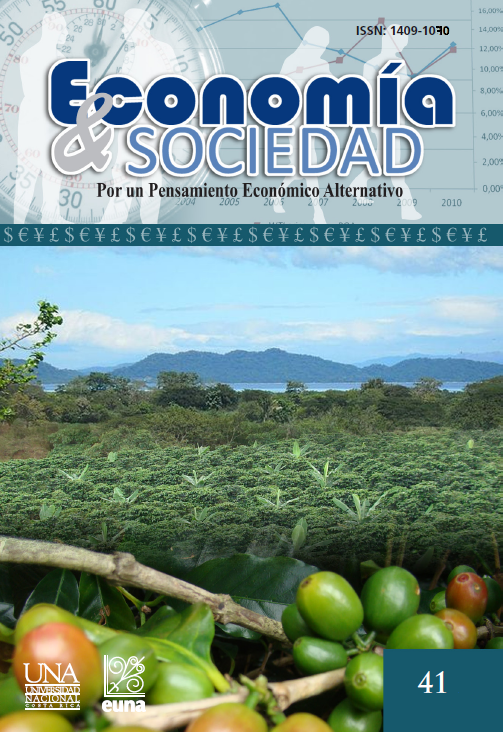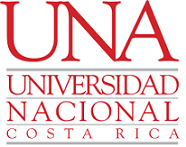Gobernanza en las Cadenas Globales de mercancías/valor: una revisión conceptual
Palavras-chave:
Cadenas de valor, cadenas globales de mercancías, gobernanza, competitividadResumo
Resumen
En este documento se analiza el sistema de gobernanza de las cadenas de mercancías/valor a efectos de establecer los elementos conceptuales que se requieren para su análisis y derivar consecuencias analíticas para estudios que se realicen con la intención de mejorar la competitividad de actores participantes en los segmentos periféricos de las cadenas, desde países en vías de desarrollo. El análisis se efectúa siguiendo el enfoque de cadenas globales de mercancías y su evolución hacia el concepto de cadenas de valor.
Palabras claves: Cadenas de valor, cadenas globales de mercancías, gobernanza, competitividad.
Abstract
This paper analyzes the governance system of commodity chains in order to establish the conceptual elements that are required for the compression and analysis of this methodology. In addition, some analytical implications are proposed for studies intended to improve the competitiveness of actors participating in the peripheral segments of the chains from developing countries. The analysis has been conducted under the focus of global commodity chains and their evolution towards the concept of value chains.
Keywords: Value chains, global commodity chains, governance, competitiveness.
Referências
Appelbaum, R.P.; Smith D.; Christerison, B. (1994). Commodity chains and industrial restructuring in the Pacific Rim: garment trade and manufacturing en Frontiers of Commodity chain Research. Stanford University Press, California.
Bair, J. (2009). Global Commodity Chains: Genealogy and Review, en Frontiers of Commodity chain Research. Stanford University Press, California.
Barrientos, S.; Gereffi, G. y Rossi, A. (2010). “Econonomical Social upgrading in Global Production Networks: Developing a framework for analysis”. Capturing the chains working paper 2010/3.
Buhalis, D (2003). Tourism – Information technology for strategic tourism management. Prentice Hall, Harlow, UK.
Coe, N. M. and Hess, M. (2007). “Global production networks: Challenges and debates”. Paper prepared for the GPERG workshop, University of Manchester, 25-6 January 2007. Disponible en: http://www.sed.manchester.ac.uk/geography/research/gpe/downloads/Manchester_Jan07_positionpaper_final.pdf. Recuperado el 12 de octubre del 2007.
Díaz, R. (2009). Políticas y estrategias en las cadenas globales de mercancías; diseño de políticas sectoriales en Cadenas Globales: Enfoque para agroindustrias de países en desarrollo; editado por Díaz, Rafael; Pelupessy, Win y Fernando Sáenz. Editorial Universidad Nacional, Heredia Costa Rica.
Gabel, H.L., Sinclair-Desgagne, B. (1999). “The firm, its Procedures and Win-Win Environmental Regulations”. INSEAD Working Paper Series, Fontainebleau, France.
Gereffi, G.; Humphrey, J. and Sturgeon, T. (2005). “The Governance of Global value chains”. Review of International Political Economy.
Gereffi, Gary (1999). “International Trade and industrial upgrading in the apparel commodity chain”. Journal of International Economics. Pp. 37-99
Gereffi, G. (1994). “The Organization of Buyer-Driven Global Commodity Chains: How U.S. Retailers Shape Overseas Production Networks”. En Commodity Chains in the Capitalist World-Economy Prior to 1800; in Commodity Chains and Global Capitalism, Editado por Gereffi, G. y Korzeniewicz, M.; Editorial Praeger.
Gereffi, G.; Humprey, J.; Kaplinsky, R. y Sturgeon, T. (2001). “Introduction: Globalization, Value Chain and Development, en the value of value chains. Spreading the gains from Globalization”; Editado por Gereffi, G.; Kaplinsky, R.; IDS Balletin.
Gibbon, P. (2001). “Upgrading primary production: A global commodity chain approach”. World Development Vol.29, N°2. Pp. 345-363.
Hopkins, T. K. y Wallerstein, I. (1994). Commodity Chains in the Capitalist World-Economy Prior to 1800; in Commodity Chains and Global Capitalism, Editado por Gary Gereffi y Miguel Korzeniewicz; Editorial Praeger.
Kaplinsky, R.; Morris y Mike (2000). A hand book for Value Chain Research. IDRC.
Korzeniewicz y Martin. (1994). The global distribution of commodity chains, en Frontiers of Commodity chain Research. Stanford University Press, California.
Nadvi, K. (2008). "Global Standards, Global Governance and the Organization of Global Value Chains." Journal of Economic Geography 8, no. 3 p.p.: 323-343
Pérez, J.R. (2002). Encadenamientos globales y pequeña empresa en Centroamérica. FLACSO, San José, Costa Rica.
Poon, A. (1993). Tourism Technology and Competitive Strategies. CAB International.
Porter, M. (1985). Competitive Advantage. Creating and Sustaining Sipenis Performance. The Free Press.
Sturgeon, T. (2009). From Commodity Chains to value chains: Interdisciplinary Theory Building an Age of Globalization, en Frontiers of Commodity chain Research. University Press, California.
Talbot, J. M. 2009. The comparative advantages of Tropical Commodity Chains Analysis; en Frontiers of Commodity chain Research. Stanford University Press, California.
Valpy, G.(1998). “La CEPAL y la teoría de la industrialización”. Revista de la CEPAL “cincuenta años St. Antony's College, Oxford.
Wallerstein, I. (1994). Development: Lodestar or Illusion?, en Capitalism & Development. Editorial Routledge.
Williams, E. B. (1999). Diccionario Inglés-Español 2da Edición. University of Pennsylvania. McGRAW-HILL.
Downloads
Publicado
Como Citar
Edição
Seção
Licença
This publication is subject to the Creative Commons License; therefore, its attributions and restrictions must be respected.
Authors publishing in this Journal accept the following conditions:
- Authors retain copyright ownership and give the Journal first publication right of the paper, which is registered with the Creative Commons Attribution-NonCommercial-ShareAlike 4.0 International License. This license allows third parties to use the published work provided it is sourced as firstly published in this Journal.
- Authors may enter into other independent and additional contractual agreements for the non-exclusive distribution of the article published in this Journal (e.g., to be included in an institutional repository or published in a book) provided it is clearly stated that the work was published in this Journal for the first time.
- Authors are allowed and recommended to publish their work on the Internet (for example, on institutional or personal pages) before and during the review and publication process, as it can lead to productive exchanges and a greater and faster dissemination of work published.

The Economía & Sociedad Journal, published by Universidad Nacional, is licensed under a Creative Commons Reconocimiento-NoComercial-CompartirIgual 4.0 Internacional License. Based on http://www.revistas.una.ac.cr/index.php/economia.








